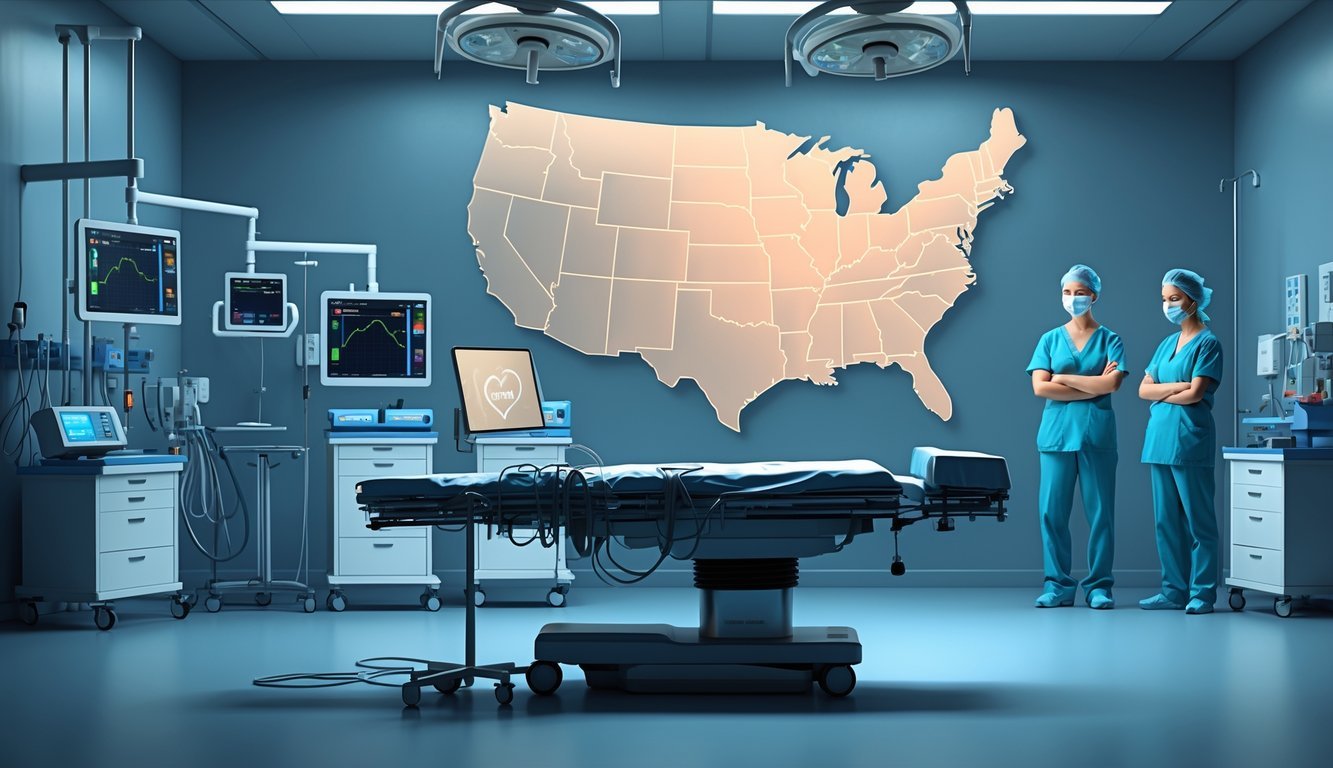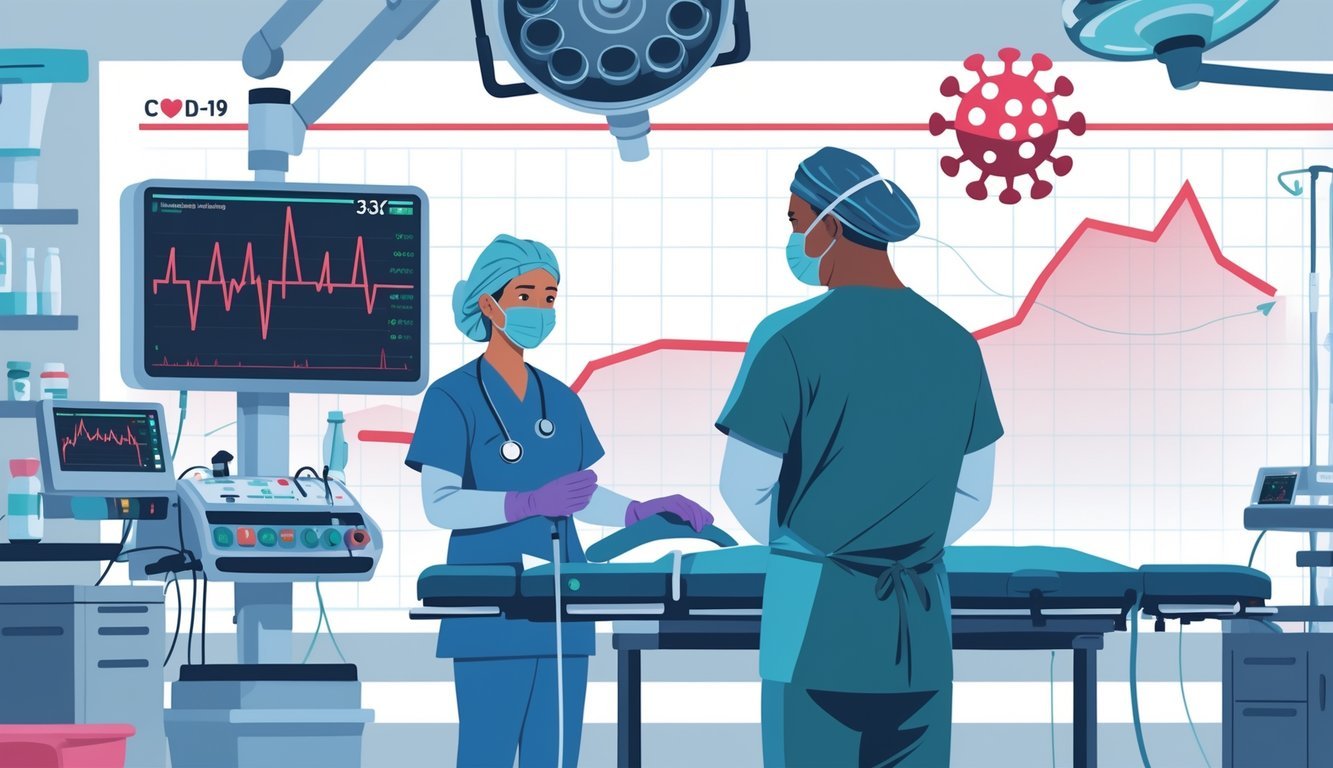PsychNewsDaily Publishers
100 Summit Drive
Burlington, MA, 01803
Telephone: (320) 349-2484
PsychNewsDaily Publishers
100 Summit Drive
Burlington, MA, 01803
Telephone: (320) 349-2484
COVID-19 caused a 53% reduction in heart surgeries in the U.S., leading to significant delays in treatment and worsening health outcomes for many patients.

A new study finds that COVID-19 triggered a huge drop in heart surgeries across the United States. Heart surgeries fell by 53% during the pandemic, leaving many people without the care they needed.
This sharp decrease hit patient health hard and forced hospitals to rethink how they handle heart problems.
Many patients just stayed away from hospitals—mostly out of fear or because of pandemic restrictions. That delay in treatment? It led to worse health outcomes.
Understanding why heart surgeries dropped so much really shows how vital timely care is, even during a crisis.
You might be asking yourself how this change affects you or your loved ones. Let’s break down the main facts and take a look at what could be next for heart surgery in the U.S.

The COVID-19 pandemic led to a huge drop in heart surgeries across the United States. Both planned and emergency surgeries took a hit, although some regions felt it more than others.
You’ll see just how much surgeries fell, which types of procedures were affected, and which states saw the sharpest declines.
Researchers found a 53% decrease in adult cardiac surgery volume during the pandemic. Compared to before COVID-19, over half of expected heart surgeries got postponed or canceled.
The Society of Thoracic Surgeons (STS) Adult Cardiac Surgery Database tracked these numbers nationwide. The drop wasn’t minor—it touched almost every hospital performing adult heart surgeries in the country.
This all happened mostly in the early months of the pandemic, when hospitals focused on COVID-19 patients and limited other surgeries to slow the spread.
The pandemic caused a sharper fall in elective procedures—the ones planned ahead, like valve repairs or bypasses. Hospitals delayed many of these to keep beds open.
Non-elective cases—emergency and urgent surgeries—also dropped, but not as much. Some patients waited too long to seek care, which meant fewer emergency surgeries but likely worse outcomes.
This shift shows how the pandemic changed heart surgery: planned surgeries paused, and emergencies got riskier due to treatment delays or hospital overload.
The drop in heart surgeries hit some states harder, especially New York, New Jersey, and Pennsylvania. In April 2020, these states saw about a 71% decrease in heart surgeries—far higher than the national average.
These regions faced the brunt of the virus early on. Hospitals in New England and other areas also saw cuts, but not as severe.
If you live in these states, you probably noticed how much harder it was to access cardiac surgery compared to other regions.

The big drop in heart surgeries during COVID-19 changed things for both patients and hospitals. Hospitals had to shift how they managed services, and the types and urgency of surgeries changed too.
These shifts ended up affecting patient health outcomes and the way care was delivered.
Many people who needed heart surgery faced delays or outright cancellations. That led to worse health for some—higher risks of complications and even death.
Urgent cases like heart attacks and severe valve problems sometimes got pushed back too. This made heart failure and other serious issues more likely.
Studies show mortality rates among heart surgery patients actually went up during the pandemic. Patients arrived sicker, and hospitals were stretched thin.
So, fewer surgeries didn’t just mean less care—it meant more deaths from untreated heart problems and worse outcomes over time.
Hospitals struggled to manage heart surgery while caring for COVID-19 patients. They had to send more resources—like ICU beds and staff—to those with COVID-19.
Protective gear and stricter masking rules slowed down surgery scheduling. You might have noticed longer waits for tests or treatments because of all this.
Hospitals changed how they handled inpatient care to limit virus spread. That meant fewer non-urgent surgeries, such as mitral valve repairs (MVR) or aortic valve replacements (AVR).
Staff shortages and the risk of infection made cardiac surgeons and other healthcare workers cut back on elective surgeries to keep everyone safe.
If you needed heart surgery during COVID-19, you faced higher risks. Delays made heart failure or worsening symptoms more likely.
Hospitals still performed emergency surgeries like coronary artery bypass grafting (CABG), but in smaller numbers. Some patients with coronary artery disease just had to wait longer.
Being in the hospital carried extra risk because of possible COVID-19 exposure. If you caught the virus, your heart surgery recovery could drag out or get more complicated.
Many people missed out on follow-up visits, which are crucial after surgeries like valve replacements or coronary bypasses.
The pandemic totally changed the volume and type of heart surgeries hospitals performed. We saw a 53% nationwide drop in adult cardiac surgeries, and even urgent cases fell by 40%.
Hospitals started to prioritize emergency surgeries over elective ones. They did this to save resources for COVID-19 patients and keep admissions lower.
Doctors turned to more conservative treatments when surgery wasn’t possible right away. This changed how they handled acute cardiovascular disease.
Both Europe and the US saw these trends—the COVID effect really shook up cardiovascular care and hospital practices during the crisis.

Heart surgery rates in the U.S. dropped by more than half during the COVID-19 pandemic. Many patients faced delays, and this has raised health concerns. Hospitals had to change safety measures and strategies to protect patients.
You saw a 53% drop in adult heart surgeries during the pandemic. Elective surgeries dropped by about 65%, and urgent surgeries fell by 40%.
Hospitals postponed a lot of operations to focus on COVID-19 cases.
Yes, getting COVID-19 before or after surgery can make recovery much harder. The virus weakens your lungs and immune system, so complications after heart surgery become more likely.
It’s smart to follow hospital safety rules—wear a mask, wash your hands, and steer clear of crowds before and after surgery. Stay in touch with your healthcare provider if you start to feel sick.
Delays can make heart conditions worse. That means higher chances of severe symptoms or even death.
Hospitals are now scheduling more surgeries and extending operating hours. They prioritize patients based on urgency and take extra steps to minimize COVID-19 exposure during procedures.
People who waited to get surgery might end up with lasting heart damage. In some cases, recovery takes longer than expected.
When you leave a serious heart problem untreated for too long, it often gets tougher to fix down the road.